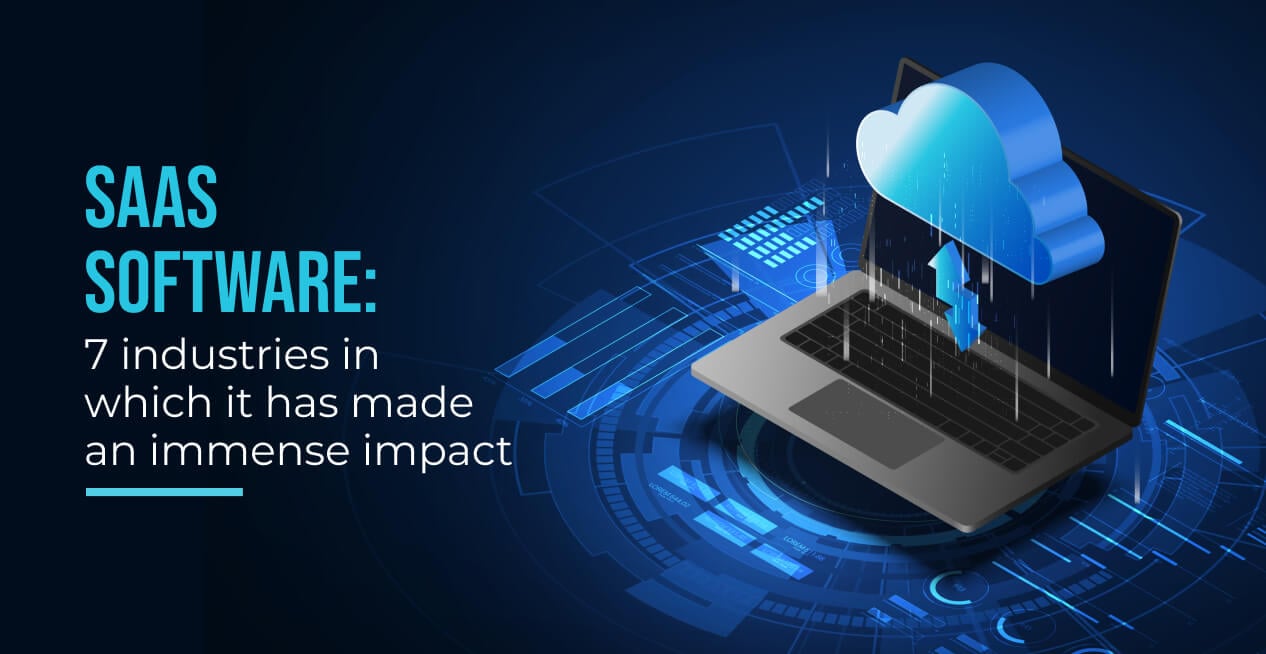SaaS: Everything you need to know
Traditionally, companies invested optimum capital in on-premise infrastructure to streamline business analytics, CRM, and automation. However, with the changing times, the rise of cloud technology has been exponential. In recent years, it has been possible to operate the whole business offsite using SaaS or Software-as-a-Service.
Companies can now leverage various applications to expand swiftly without incurring high overhead expenses. With growing times of digitalization, SaaS noticed subtle improvements & developments in response to the hyper-specialization of the business & demands of the modern work environment.
External factors like the COVID pandemic, location changes, and remote working changed how employees used to communicate with customers & colleagues. It paved the way for a rising plethora of new collaboration and platform tools, most of which SaaS controls today.
The increasing demand for SaaS has yet to show any loop down in its growth. Gartner forecasts 16.8% growth for SaaS in the year 2023. Further predictions suggest that the global SaaS industry will be fuelled up with a worth of $60.36 Bn by 2023.
All these growing stats indicate us to know more about SaaS. Grasp the advantage of knowing everything about it so that it can be helpful for your business. Today, SaaS is a game changer, a popular delivery model, accelerating with digital transformation. Let’s explore in-depth information about which industries witnessed the immense impact.
What is SaaS?
Software as a service (SaaS) entitles users to connect to and utilize cloud-based applications via the Internet. It provides a whole software package one can buy from a cloud service on a pay-as-you-go basis. Businesses can rent the app for their organization, and employees can connect to an app through the internet, typically using a web browser.
The primary infrastructure is located in the service provider’s data center, including middleware, app software, and app data. According to the terms of the agreement, the service provider guarantees the app’s accessibility and security.
SaaS offers minimal upfront costs. It also allows the organization to gear up with a running app quickly. Many firms started to employ it as the standard model due to its impeccable features. Additionally, it provides increased collaboration, accessibility, scalability, security, regular upgrades, and flexible payment options.
What is the significance of SaaS to the IT industry?
SaaS (Software as a Service) has significantly impacted the IT industry. Some key ways it has brought a remarkable effect include:
- Increased accessibility: SaaS makes software available to a wide range of users, including small-medium-sized businesses that may not have the resources to purchase and maintain software independently.
- Cost savings: SaaS typically requires a lower upfront investment. It has lower ongoing costs than traditional software, as customers only pay for what they use and do not need to maintain the infrastructure.
- Scalability: SaaS can quickly scale to meet the changing needs of a business, as customers can increase and decrease their usage.
- Flexibility: SaaS can be accessed from any device with an internet connection, allowing customers to work from anywhere, anytime.
- Automation: SaaS helps to automate repetitive business processes and increased efficiency.
- Regular updates and improvements: SaaS typically provides regular updates and improvements to its customers with the latest features and technologies.
Overall, SaaS has made software affordable and accessible for businesses of all sizes and made it easier for companies to adopt and use new technologies.
Types of SaaS software
Horizontal and vertical SaaS are two types of Software as a Service designed to serve different customers.
1. Horizontal SaaS
Horizontal SaaS refers to the software used by businesses across a wide range of industries and functional areas such as email, CRM, and project management. These kinds of software are made to be adaptable and may be tailored to meet the requirements of various organizations. This enables catering to a broad range of customers.
For instance, Google Hangouts and Microsoft Teams are examples of communication solutions created by Google or Microsoft.
2. Vertical SaaS
Vertical SaaS is designed to be used in specific industries or by particular businesses according to their niche industry. It is tailored to cater to industry or business needs and typically has particular features and functionalities.
For example, one can consider Toast software specific for the restaurant business or Guidewire, a SaaS service that only develops software for the insurance industry.
In general, horizontal SaaS solutions are more widely used and are considered more general-purpose solutions, while vertical SaaS solutions are more specialized according to the niche industry.
Types of Industry: SaaS influence
SaaS comes in several types, each tailored to the industry’s requirements. The primary factor dividing software into groups is the area in which SaaS products advance. The fact is that new groups of SaaS products will appear shortly. Soon, new groups of SaaS products will appear shortly. It covers practically all areas of human activity. Another reason that paved the road for exponential growth is Work-from-home opportunities during the Covid-19 pandemic, which increased demand for it.
There is no doubt that the number of SaaS applications will increase tremendously in the next few years. The following are the present types of software as a service:
1. Customer Relationship Management
CRM software is a valuable tool for efficient management, providing a 360º view of all your customer data. It helps improve customer relationships. Every organization’s customer data is essential information. Hence, CRM is used to market the product and boost sales.
Few CRM systems also let users estimate sales, though the majority handle other sales tasks like sending emails. Modern CRMs like Hubspot enable customer support, sales, and marketing simple features like live chat, meeting scheduling, and email tracking.
Yet another example is Freshworks. It offers easy-to-use marketing, sales, support, and IT solutions. Depending on the business needs, more than ten products are available, which can be integrated into each other.
2. Accounting
Maintaining accounting software is crucial to simplify financial operations and costs by automating them. This process becomes a necessary task of the day if you are doing many accounting transactions.
Many SaaS products are available in this category, but the major difference lies in their features. One must choose according to the needs & expectations when it comes to handling your finances. The most used ones are QuickBooks and Xero; they have effective integrations.
In Xero, for instance, you can find striking features. It includes paying bills, claiming expenses, tracking projects, bank reconciliation, managing Xero contacts, capturing data, files, reporting, inventory, sending invoices, multi-currency, and many more that can run your business better.
Finally, Xero has integrations with banks and online financial services like Paypal, which facilitates seeing your account balance and transactions.
3. Project Management
Using project management software, your team can collaborate in a virtual environment where you can see the work your business has completed and monitor and manage ongoing projects. Compared to shared spreadsheets or documents, it is quicker and easier because synchronization occurs in real time.
Atlassian is the most widely used PM SaaS with extra tools and features. The premium plan enables teams to have the faith to scale reliably with advanced features, plus a 99.9% uptime SLA, unlimited storage, and Premium Support.
4. Enterprise Resource Planning (ERP)
Organizations utilize Enterprise Resource Planning (ERP) software to manage routine business processes, including accounting, purchasing, project management, risk management, and supply chain management. Enterprise performance management is another component of a comprehensive ERP suite. The program aids in financial planning, budgeting, forecasting, and reporting for an organization.
ERP systems sustain the data flow and connect various corporate activities. ERP systems prevent duplication by gathering the organization’s shared transactional data from several sources.
For managing organizations of all sizes and industries, ERP systems are essential.
5. Email Marketing
Email marketing software enables users to create, send, and track emails to their list of subscribers. Using Software makes creating well-designed emails easier and allows you to see key metrics such as open and click-through rates.
For instance, Mailchimp is a free, easy-to-use email builder with the tools you need to grow your business. It also has fantastic email designing tools that make you like a pro.
6. Security
Security software protects a computer, network, or any computing-enabled device from being tracked by others. Companies have crucial information about clients to avoid being a target of unauthorized access, intrusions, viruses, and other bugs. This security software protects the user data like a shield and maintains confidentiality. It avoids reaching third parties outside the organization.
Norton is one example of security software. It offers a complete internet security suite for all devices, a secure VPN, a password manager, and cloud storage. Impeccable features like performance optimization and parental tools make it ideal for use.
7. Metaverse
SaaS and metaverse are projected to grow more vivdly in the digital sphere. The metaverse is still in its early stages, but if its qualities are effectively explored, its relationship to SaaS becomes clearer.
For the metaverse to produce truly immersive experiences, purpose-built, adaptable networks with low latency are necessary. Modern SaaS solutions are built to accelerate operations, improve outcomes, and streamline networks and workflows. All of these elements play a crucial role in the metaverse experiences, especially for those taking place in commercial settings.
SaaS will soon be reoriented to function in the metaverse. It can quicken the metaverse and aid in creating digital realities from immediate non-virtual situations and experiences.
Latest 2023 statistics about SaaS
Here are a few latest SaaS statistics you need to know!
Today, SaaS is becoming a game-changer in digital technology. SaaS solutions are becoming more popular, and more businesses are incorporating them into their workflow.
After learning these figures, you’ll better understand why industry influencers prefer SaaS.
Here is a sneak peek at the most recent trends:
- Implementing new software takes reduced time
SaaS solution deployment is no longer a complex process. The average time it took to implement a new software product earlier was 57 hours a decade ago, but now it hardly takes 7 hours. - The giant cloud SaaS users are software engineers
According to the SaaS survey, 20% represent software engineers. Next on the list are technical leads and architects, representing 11% of respondents. - 70% of the business apps are SaaS-based
According to a recent SaaS survey, 70% of the business apps they use today are SaaS-based. - Companies that use SaaS can introduce new features more quickly
Businesses that use cloud platforms can bring new capabilities 20% to 40% faster. - The top five public cloud firms’ values increased by 44 times
The value of the top 5 public cloud companies climbed by up to 44 times between 2008 and 2020. - SaaS continues to dominate the public cloud segment
The SaaS market is anticipated to reach $104.7 billion by the end of 2020. - By 2030, it is anticipated that India’s SaaS market will be worth $50 to $70 billion
Experts predict India’s SaaS market will grow from $50 to $70 billion by 2030. By then, it should have captured 4-6% of the worldwide SaaS market. - By 2026, the SaaS market for web and video conferencing will grow to $7 billion
Global Industry Analysts Incpredicts that the web & video conferencing SaaS market will reach $7 billion by 2026. Because of this strong demand, companies shifted to remote workforce setup. - Till June 2020, 15,529 SaaS companies were operating worldwide
There are 15,529 SaaS businesses worldwide, according to Crunchbase (via Card Connect) - Today, it is ten times faster to build a software company
The reason why there are so many SaaS companies is that it is easy to start one today. A decade ago, there were only 500 marketing software products, whereas today, there are over 8,500. - In five years, 95% of workloads will be run by the cloud
27 % Industrial influencers predict that in the next five years, 95% of the workload will be executed on the cloud.
Top 10 Software as a Service (SaaS) Companies in 2022
As everyone knows, the SaaS business model dominates digital technologies, take a look at the businesses that have been trailblazers in recent years.
- Adobe
- Atlassian
- Freshworks
- Microsoft
- Salesforce
- Xero
- ServiceNow
- Zoho
- Zoom
These ten companies are leading the pack, spurring ground-breaking inventions and a wave of industry disruptors that will make SaaS the new default for digital transformation.
There is no doubt that SaaS will explode in the future.
Final thoughts
SaaS is growing seamlessly. SaaS models are becoming preferred by many enterprises for various reasons. Due to its flexibility and affordability, customers increasingly use the subscription-based pricing model to meet their IT needs. Due to this, established businesses do not despise SaaS despite their size. Instead, they are adopting the Software as a Service paradigm to meet various needs with modern solutions.
It’s time to step it up! Get in touch with OpenXcell and leverage customized software-as-a-service solutions specifically curated for your business.
Try our 30-minute free consultation and make innovation, intelligence, and growth your top priorities in 2023.
Openxcell’s SaaS offerings
Are you looking to innovate your business with high-quality SaaS products to remain competitive?
You’ve reached the correct place; OpenXcell is the top SaaS development services provider in India and the USA.
We have extensive experience in SaaS. Our stringent approach to SaaS product development meets your business requirements, building futuristic solutions. Our professionals help you build SaaS apps that are reliable, secure, and user-friendly.
For more information,
Visit our website,
https://www.openxcell.com/










